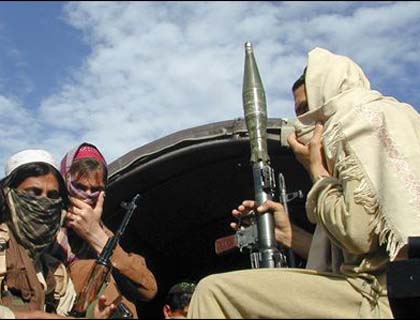The peace process with the Taliban militants is getting complicated in a strange way. Firstly, it got out of the control of Afghan government and seemed to be led by US, Germany and Qatar. But after few initial vague and secret meetings, Taliban leaders rebuffed to continue talks on the account of, according to their claims, lack of clear and transparent policy by US. Thus, after pulling out of Taliban leaders from peace talks with the US, there is nothing on the landscape succession of deal with militants.
Indeed, opening a diplomatic door with Taliban was not the idea of foreign allies from the start. Instead, during past years, they stood strongly behind military strategies to win anti-insurgency struggle in the country.
Ending to Taliban regime in no time and the blunt failure of Taliban leaders to resist even for a short time made foreign allies push for their military strategy. In addition, the collapse of Taliban regime was welcomed nationwide due to affliction they suffered under the oppressive and cruel regime of Taliban, helped in military miscalculation.
Many thought that Emarat-e-Islami thereafter should be studied only on the chapters of history. Similar view was held by foreign allies as they thought that Taliban-led militants would not resurge as they had the support of large population along with armed north alliance.
Moreover, Taliban regime clearly backed the incident of 9/11and did not accept to hand over the al-Qaeda leader. The stance bought the regime in the fold of mounting global hatred which largely helped the former US president Bush to get the approval of United Nations and international community to intervene and eliminate the regime. The pressure also mounted highly against all those countries had/have links. They were pressurized to cut ties and support the global initiative.
These all measures and processes fuelled optimism, but unfortunately did not last long. Taliban leaders found safe-hideouts other than Afghanistan. They have been living there without fear of persecution. They could/can move freely here and there without fear of persecution from legal establishment of countries where they are kept secret.
Though Taliban could not stand against the military might of US-led international community, they could, in contrast to political and military calculations, rapidly change strategy and resurge back to the country. They used from those safe-hideouts and redesigned the strategy to fight against Kabul government and its foreign allies. After the successful resurgence, international community came into an understanding that they underestimated militants and overestimated their influence over countries which had close ties with Emarat-e-Islami.
But the recognition was too late. The water has already spilled to an infertile land and the tide changed. Many countries which had large support of civilians to fight against insurgency increasingly facing unexpected civilian pressure to pull back as soon as possible, in home. There remained no strong logic for them to justify the struggle taking lives of their troops and wasting billions of taxed dollars while the unemployment rate was in a horrifying level.
So, time proved to be in the favor of militants.
Afghan people are worried about the future after withdrawal and many forecast about breakout of civil war once again. Meanwhile, they are also disappointed and have become sensitive about the presence of foreigner. Of course there were several other principle factors fuelling further the mayhem like corruption, inefficient administration, presence of influential people who are charged of human rights violation within the government, recent unfortunate incidents which led to demonstrations and etc.
Thus, in order to break the tide once again, President Karzai launched a new initiative which was supported by foreign allies too—trying diplomatic measure and sitting with Taliban leaders on the negotiation table. In this sphere, Mr. President Karzia tried hard to persuade foreign allies to handover the peace initiative entirely to his government, in which he succeeded. He and his government were entirely authorized to negotiate and bargain with militants.
He called upon a grand traditional assembly, Loya Jirga, and established a High Peace Commission to talk with militants leaders. But the Taliban showed no flexibility and warned to target High Peace Commission members, as they did. When the Chief of High Peace Council and former President, Mr. Burhanuddin Rabbani was assassinated in his very house, Mr. President said that he would talk directly with Pakistan instead of Taliban leaders. Mr. Rabbani's murder brought the peace process in a deadlock and proved that the endeavors were not successful.
So, the failure of Afghan-led peace process and lack of any diplomatic measure to attract Taliban leaders made US and its allies step in and launch talks with militants, without engaging Afghan government. And Taliban also agreed to talk with US as they always emphasized that Afghan government was not authorized and would talk with the United States directly.
As I noticed, Taliban publicly announced the suspension of peace talks with the United States, due to unexplained reasons. Before talks with the US, there were reports about release of Taliban highly influential figures from Guantanamo as sign of sincerity in peace deal. But after the withdrawing from peace talks, it was expected that Taliban leaders remain in prison.
Presently, strange and freaking report is this that the US wants to release five Taliban leaders from Guantanamo. "The US has agreed to free and transfer the Taliban prisoners to Qatar to meet their families there", the High Peace Council advisor on international affairs said. Mohammad Ismael Qasimyar told that US wanted an assurance from Qatar government that the released prisoners do not return to militancy.
Why they are released if Taliban do not show least flexibility and willingness in peace deal? Who can assure that they may not turn to militancy if they found themselves under no control? The only answer is that the commitment of foreign allies has loosened; otherwise there is no reason to release Taliban's highly influential leaders.

